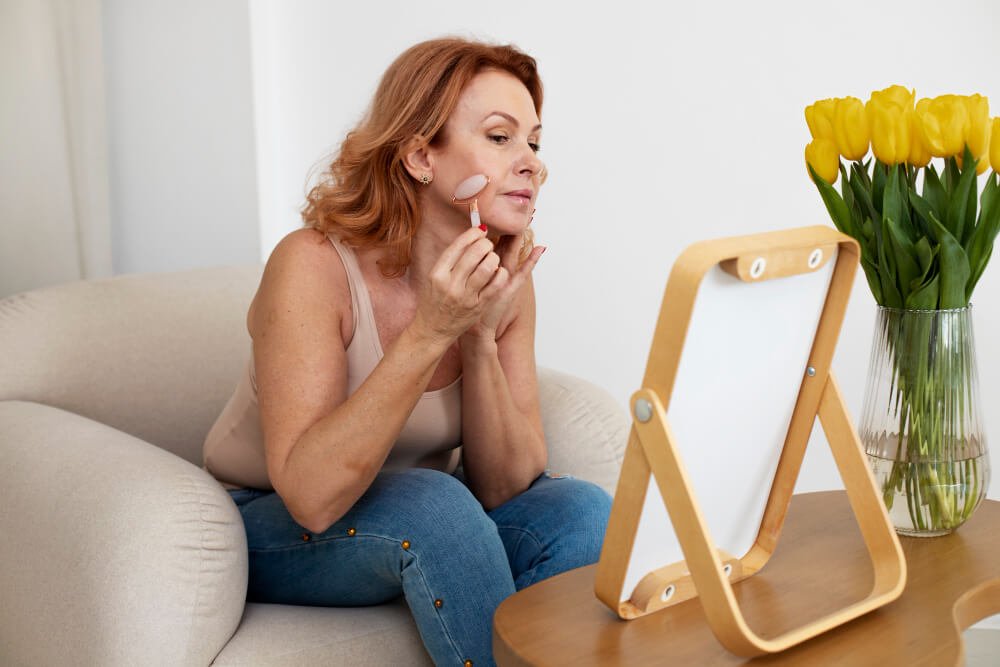Menopause is a natural transition in a woman’s life, but it often brings visible changes to the skin. As estrogen levels drop, the skin can become thinner, drier, and more reactive.
Many women notice that their complexion, once resilient, now shows redness, irritation, and heightened sensitivity.
Table of Contents
Why Menopausal Skin Becomes Sensitive
This happens because estrogen helps regulate skin hydration and elasticity. When hormone levels decline, the skin barrier weakens, leaving it more vulnerable to environmental aggressors like sun, pollution, or harsh skincare products.
Redness, flushing, and sensitivity become common complaints, especially on the cheeks, nose, and chin.
aster cell renewal = younger skin. Click here to discover how it works.
Hormonal Shifts and Their Impact
Estrogen plays a vital role in maintaining skin thickness, moisture, and collagen production. When levels decrease during menopause, the skin becomes less resilient. This shift increases the likelihood of rosacea-like symptoms, irritation, and redness.
A Weaker Skin Barrier
The skin barrier is like a shield that protects against external irritants. In menopausal skin, this shield often becomes compromised, leading to inflammation, dryness, and heightened sensitivity to skincare products or environmental triggers.
Reduced Oil Production
Sebum production naturally declines, and while this can reduce acne, it also means that skin can feel tight, flaky, and more vulnerable to redness.
Without enough natural oils, the skin struggles to maintain comfort and balance.
Unlock the 9 natural secrets to glowing skin—explore the official page today.
Common Triggers of Redness in Menopausal Skin
Every woman’s experience is unique, but some common triggers tend to make redness and sensitivity worse:
- Hot flashes that cause sudden flushing and warmth
- Spicy foods, caffeine, or alcohol that dilate blood vessels
- Stress, which can worsen inflammation
- Temperature extremes, such as very hot showers or cold winds
- Harsh skincare ingredients like alcohol, sulfates, or strong exfoliants
By identifying these triggers, women can begin to minimize flare-ups and regain more control over their skin’s comfort.
Gentle Skincare Strategies for Sensitive Skin
Prioritize Hydration
Moisture is the foundation of calmer skin. Use a fragrance-free, hydrating cleanser that won’t strip natural oils. Follow up with a moisturizer rich in ceramides, hyaluronic acid, and glycerin, which help restore the skin barrier and lock in hydration.
Simplify Your Routine
When skin is sensitive, less is more. Avoid layering too many active ingredients. Stick to gentle, soothing formulas that calm irritation rather than provoke it. Consistency is key, not complexity.
Use Cooling Techniques
If redness flares up after hot flashes, apply a cool compress to the face for a few minutes. Keeping skincare products in the refrigerator can also provide instant relief and reduce redness.
Ingredients That Calm Redness
Not all skincare ingredients are suitable for menopausal skin. Look for soothing and barrier-strengthening components:
- Niacinamide: reduces redness and improves skin barrier function
- Aloe vera: provides cooling and hydrating relief
- Green tea extract: an antioxidant with anti-inflammatory benefits
- Panthenol (Vitamin B5): restores comfort and calms irritation
- Centella asiatica (Cica): widely known for its healing and soothing properties
Avoid aggressive ingredients like high-strength retinoids, strong acids, or alcohol-based toners. These can worsen sensitivity and flare-ups.
The Role of Sun Protection

Why Sunscreen Matters More Than Ever
Menopausal skin is more prone to sun damage, which can worsen redness and increase the risk of broken capillaries. Daily broad-spectrum sunscreen with SPF 30 or higher is essential, even on cloudy days.
Choosing the Right Sunscreen
Opt for mineral sunscreens containing zinc oxide or titanium dioxide. These tend to be less irritating than chemical sunscreens and provide a soothing layer of protection. Look for formulas labeled “for sensitive skin.”
Lifestyle Adjustments to Support Skin Health
Cooling Foods and Drinks
Eating foods rich in antioxidants and omega-3 fatty acids can help reduce inflammation. Green tea, fatty fish, and berries are excellent additions to a menopause-friendly diet. Staying hydrated also prevents the skin from feeling tight and uncomfortable.
Stress Management
Stress increases cortisol, which in turn can worsen inflammation and redness. Practicing mindfulness, deep breathing, or gentle yoga helps balance both mind and skin.
Restful Sleep
Sleep allows the body to repair and regenerate. Lack of quality sleep can leave skin more reactive and less able to recover from irritation. A consistent nighttime routine benefits both overall health and complexion.
Professional Treatments for Menopausal Skin
LED Light Therapy
Red light therapy has been shown to reduce inflammation and redness, while supporting collagen production. It’s non-invasive and safe for sensitive skin.
Gentle Peels and Facials
While strong chemical peels should be avoided, gentle enzyme-based facials can improve skin texture without causing irritation. Always consult with a dermatologist for customized treatments.
Prescription Options
For severe redness, such as rosacea-like symptoms, a dermatologist may prescribe topical or oral treatments to control inflammation and restore skin balance.
Key Takeaways for Calmer, More Comfortable Skin
- Moisturize daily with soothing, barrier-strengthening products
- Avoid triggers like spicy foods, alcohol, and extreme temperatures
- Protect your skin with mineral sunscreen every morning
- Choose gentle ingredients such as niacinamide, aloe vera, and green tea
- Consult a dermatologist for personalized solutions if redness is persistent
Final Thoughts – How to Alleviate Skin Redness and Sensitivity in Menopausal Skin
Menopause is a time of transition, and while it can bring challenges like skin redness and sensitivity, it’s also an opportunity to embrace self-care with a more nurturing approach.
By adopting gentle skincare strategies, choosing calming ingredients, and making supportive lifestyle changes, mature women can regain comfort and confidence in their skin.
Remember, sensitive skin doesn’t mean giving up on beauty, it simply means adjusting your routine to meet your skin’s new needs. With the right guidance and consistent care, redness and irritation can be significantly reduced, allowing your natural radiance to shine through.

